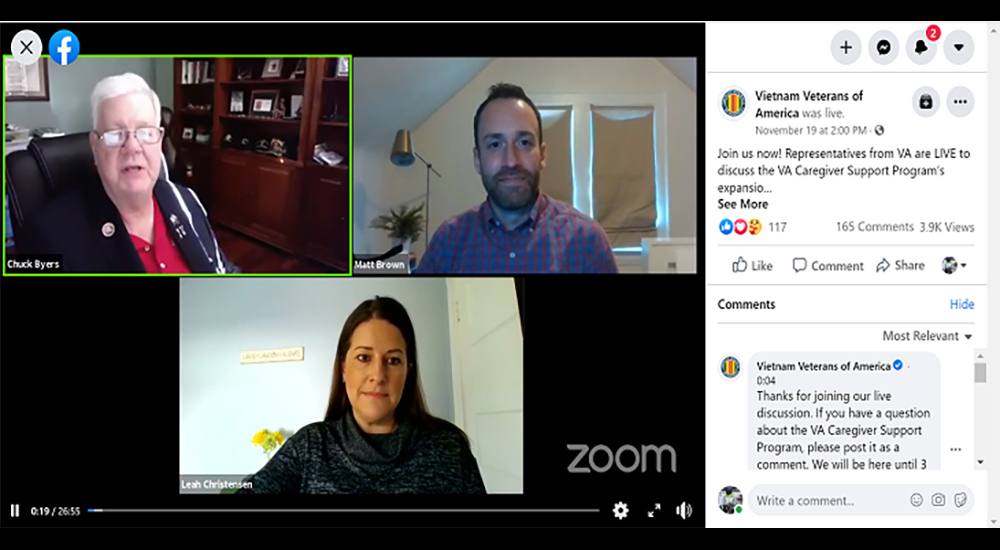VA and Vietnam Veterans of American (VVA) recently teamed up to host a Facebook Live event to spread the word about the recent expansion of VA’s Program of Comprehensive Assistance for Family Caregivers (PCAFC) to WWII, Korean, and Vietnam Era Veterans.
Under this program, benefits that previously were only accessible to post-9/11 Veterans are now available to help eligible older Veterans and their caregivers. Caregivers may receive education and training, a monthly financial stipend, respite care, as well as health insurance and beneficiary travel.
Chuck Byers, chair of Veterans Healthcare for VVA, began the event by asking panelists what VA means by the term caregiver.
Care can look different from Veteran to Veteran
Leah Christensen, Licensed Clinical Social Worker and Clinical Program Coordinator with the National Caregiver Support Program Office (CSP), explained that caregivers can be family members and friends who are helping Veterans with their care.
“Care can look different from Veteran to Veteran,” she said. “It can include helping Veterans by driving them to appointments and grocery shopping, assisting with medication management or with activities of daily living.”
Caregivers may also assist Veterans who have challenges with memory or mood, or with hands-on care needs that can impact their independence.
Through the Caregiver Support Program, caregivers can help Veterans stay safe at home for as long as possible.
Matt Brown, Licensed Clinical Social Worker and CSP’s lead for Veterans Integrated Service Network (VISN) 10, added, “We know that Veterans have better health outcomes with a strong, well-supported caregiver.
Caregivers often put themselves last
Brown continued: “We also know that caregivers often put themselves last, putting them at risk for burn-out and in a space where they are not able to take care of their loved one.”
One of the most important things we do is help caregivers take care of themselves.
VVA and CSP discussed the purpose of PCAFC and the program’s eligibility requirements. PCAFC was previously available for caregivers of eligible Veterans who incurred or aggravated a serious injury on or after September 11, 2001.
As a result of the 2018 MISSION Act, VA expanded PCAFC to provide services to caregivers of eligible Veterans who incurred or aggravated a serious injury on or before May 7, 1975. VA will expand PCAFC to include caregivers of eligible Veterans from all eras of service on Oct. 1, 2022.
Services take care of caregiver’s wellbeing
Under the new regulation, a Veteran must have a single or combined service-connected disability rating of 70% or more and need in-person personal care services for a minimum of six continuous months. Viewers were invited to ask questions during the event.
According to Christensen, PCAFC comprehensive services support caregivers to provide care to the Veteran, but also take care of caregiver’s own wellbeing. Part of the services include providing caregivers with respite services as well as support from a team of professionals.
“It’s so important for caregivers to take care of themselves,” Christensen said. “Our program has trained clinical staff at each medical center who are able to help caregivers and Veterans to make sure they have the support and resources that they need.”
Thank you to all Veterans, service members and their supporters who participated in this event!
Visit VA’s Caregivers Support Program website to learn more about how VA supports caregivers.
Watch the full video below or visit VVA’s Facebook Page.
Jill DeBord, LCSW, is the acting national director for the Caregiver Support Program.
Topics in this story
More Stories
Watch the Under Secretary for Health and a panel of experts discuss VA Health Connect tele-emergency care.
The 2024 National Veteran Suicide Prevention Annual Report provides the foundation for VA’s suicide prevention programs and initiatives.
Theranostics is a specialized field of nuclear medicine that uses a two-pronged approach to diagnose and treat cancer.






